In the Land of Fake Rolexes and Only Children
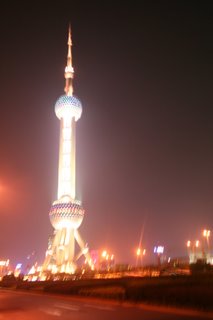 (Right: Oriental Pearl Tower, Shanghai.)
(Right: Oriental Pearl Tower, Shanghai.)Barely a day goes by without a story or bit featuring China in the news. Thirty years ago, the country infrequently made headlines as the West focused on the rising sun, Japan, and China remained shrouded behind the veil of Mao's Cultural Revolution. Twenty years ago, the West was still locked in an arms race with the Soviet Union as the threat of mutually assured nuclear destruction took center stage in the foreign policy arena. But while Japan’s economy boomed, overheated and busted and the Cold War thawed, a sleeping giant was rising from a deep slumber in the Far East.
With millennia of history, comprised of dynasties, wars, occupation, famine, drought and communist (really totalitarian) rule, the most populous country on earth is at its most advanced point in modern history and has ambitions to be number one on the world stage. Many scholars suggest that five thousand years ago, China was home to the most developed ancient civilization with advanced medicine, metal works, agriculture and art.
If the dates of the Jade and Bronze exhibits at the Shanghai Museum are correct, the Chinese were weaving silk, casting bronze, growing wheat, millet and rice; and recording events in a written language with thousands of characters in the fifteenth century B.C.. A thousand years before the English Industrial Revolution, China had advanced coke ovens and steel blast furnaces. Some contend that it was the Chinese who laid the foundation for the modern world as information from the East reached Europe.
But enduring repeated attacks and sometimes occupation from the likes of the Mongols (Genghis Khan), the British, Portuguese and Japanese, China’s early progress was retarded. Europe and the U.S. flourished while China’s largely peasant population suffered from famine and a failing economy. After WWII and the downfall of the Japanese Empire coupled with the rise of the Soviet Union, China was ripe for the communist figure who would position himself as the father of the nation. In the footsteps of Lenin, Mao Tse-Tung’s “Cultural Revolution” amounted to a brutal regime, stripping the country’s intellectuals, writers, artists and private entrepreneurs of their dignity and wealth, sending some to work in labor camps and others to their death. From 1965 to 1976, the Chinese suffered their last major setback before their bid to return to greatness.
A visit to Shanghai today leaves little doubt in the eye of the beholder that China is an economic whirlwind turning typhoon. High rises litter the city skyline of the home to more than eighteen million, the second most populous city in the world, behind only Bombay. And the urban population continues to swell as peasants in rural areas move to the big cities in search of jobs and a better quality of life, neither of which they usually find. With the hot economy receiving world press, the reality behind the numbers is that while tens of millions of Chinese are attaining greater wealth, more than a billion are being left in the dust. Demonstrations by disenfranchised Chinese are a regular occurrence, but never make the news and are quickly supressed.
Pushing Shanghai to surpass Hong Kong as the country’s financial and commerce center, the Chinese Communist Party wants the world to see what China can accomplish without the aid of “imperialist” powers. A day on the popular “Bund” in Shanghai offers a view of a thriving port operating seven days a week, the Oriental Pearl Tower (higest TV tower in Asia, third tallest in the world), the Jin Mao Tower (5th tallest building in the world, tallest in mainland China) and shopping malls as far as the eyes can see, not the images one generally associates with communism. For every foreign tourist there are three Chinese tourists visiting the same sights. The Chinese that are accumulating wealth are fast at work seeing the sights, but mostly hitting the malls at a feverish pace.
At night, it is little wonder why China’s demand for electricity and oil are growing. Neon lights illuminate and flash on every block of the downtown and then many blocks for miles around. Two days ago, the government news agency repeatedly celebrated the completion of the Three Gorges Dam project on the Yangzi River. It is heralded as the biggest dam and hydroelectric plant on earth. After displacing more than 1.5 people from ancient villages in the surrounding valleys, the government announced that the major construction phases of the project have been completed. Looped footage of a celebration plays almost hourly on CCP channel 9, the only English news channel in China.
After years of oppression during the Cultural Revolution, the Chinese people keep two lives, their public life and their private life. The foreigner has little chance to get any real insight into the people’s thoughts and daily life. In this regard I was fortunate as I had kept in touch with a friend from the states. Nick Marsick worked for a company consulting to Nextel during the days when there was a Nextel and new cell sites were in demand. If you wanted to close a deal, Nick was your man.
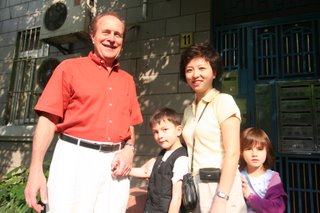 (Nick and family.)
(Nick and family.)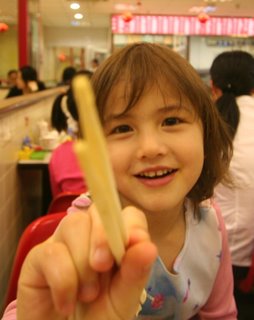
Occasionally Nick would share stories from his many lifetimes as a real estate speculator, oil and gas man, Amway sales distributor, Professor of Physical Education (he has a PhD in the subject) and teaching English in China. Listening to his stories, you knew Nick was never at a loss for words or a good story, even the ones where he lost his shirt. By the time I met Nick, he was married to his second wife, Yixin, and they had one child, Nicholas and before he left the company, they had a baby girl, Anna (now a huge flirt as you can see).
Since then, Nick and I e-mailed a few times a year touching base and catching up. When the opportunity for this trip presented itself, Nick was on the top of my list for a visit. At the time, he was living in the Anji province four hours east of Shanghai, but by the time I left the states, he had moved to Madras, India. A bit disappointed, I planned to meet Nick and family in Madras, but once again before I could make my way to see him, the family had relocated, this time to Shanghai, fitting perfectly into my plan.
Arriving Friday afternoon, my name was being paged over the baggage claim speakers, “Mr. Tod Rajio, Mr. Tod Rajio, please call 132798424865 . . .”. My name had been marred enough in life that I knew to give some latitude to the pronunciation, especially for a native Chinese tongue. Only problem was I couldn’t write down the 13 digit phone number quickly enough, didn’t have a phone and couldn’t speak Chinese to the man tending the information booth. So I reverted to the age old game of Charades. In the middle of the Departure Terminal, I stood in a crowd of hundreds before a Chinese man in his young twenty’s pointing toward the ceiling, then my ear, then me, then pretending to hold an invisible phone to my ear. What was I trying to say? Translated into my language it meant, the operator just called my name over the loudspeaker and I want to call the number that she read outloud. What did the young Chinese man in the information booth think I meant, “I heard voices from God talking to me and I urgently need to call him back”. I guess my Charades skills need more work, but the third time was a charm as I practically reached over the counter to call the operator myself.
With number in hand, I bought a phone card and reached Nick with a lot of wind noise blowing in the background. “Hey Todd, it’s Nick, Yixin and I are in a cab now on our way to the airport. Where are you? Stay put.” As I had realized on the plane, Nick had given me directions to reach him from a different airport so now he was en route to pick me up personally. Fifteen minutes later, we found each other and began a fast paced exchange of catch-up as we bobbed and weaved through the crowds to find the right bus back to his apartment. Cell phone in hand, Yixin seemed to be calling the operator from the Matrix, “I need a way out,” she said in Chinese (my take). Who was she calling? The city transportation bureau has phone lines dedicated to helping callers determine the fastest public transit route from point A to B.
On the bus, the conversation continued covering topics from the state of world affairs, the rise of commodity prices to the weather.
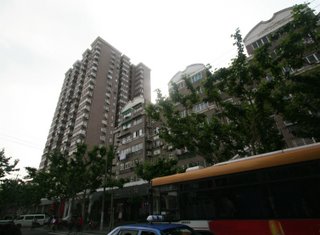 (Left: My apartment building.) Nick was still Nick and it was a joy catching up and exchanging views as if no time had passed. Two buses later, we arrived near the family apartment, but before heading upstairs, Nick and Yixin took me to my apartment. Resourceful as usual, they found me a fully furnished two bedroom, one bath apartment on the 20th floor of a building half a block from their place. We rode the elevator to the 20th floor of the six year old building where Mrs. Yan, a lady with a warm smiling face in her early 60s met us at the front door of unit 2007.
(Left: My apartment building.) Nick was still Nick and it was a joy catching up and exchanging views as if no time had passed. Two buses later, we arrived near the family apartment, but before heading upstairs, Nick and Yixin took me to my apartment. Resourceful as usual, they found me a fully furnished two bedroom, one bath apartment on the 20th floor of a building half a block from their place. We rode the elevator to the 20th floor of the six year old building where Mrs. Yan, a lady with a warm smiling face in her early 60s met us at the front door of unit 2007. The apartment was great, and for twenty dollars a night, one of few Shanghai bargains. Nick had offered her more money, but she actually refused. Both she and her husband were retired educators and owned a few apartments and some land southwest of Shanghai (as I would learn later). Mrs. Yan showed me around the apartment, asking me in Chinese if it was o.k. as Yixin translated between us. The views from the living room and bedroom overlooked many miles of the city. As in the U.S., many Chinese were speculating on a booming real estate market so units, such as my temporary abode, were sitting empty until buyers could be found.
If you’re wondering if the Chinese economy is really thriving as we read regularly, the answer is yes, but if I had to make a lay guess, Todd’s economic forecast would say it is overheating and will experience a dramatic slowdown, if only for a period of months or years. Driving through the city center and beyond, high rises serve as homes only to ghosts as drapeless windows leave thirty story buildings transaparent as Casper. Moving outside of the city center, single family homes are being built by the hundreds of thousands, but they too remain vacant years after construction is completed. Shanghai and the burbs around it are overbuilt for the time being. It may take five years or a decade for demand to catch up with supply. Most Chinese simply do not have the money to afford $80K condos and $120K homes . . . yet.
On top of the flooded housing market, the cost of living is beginning to increase for city dwellers. Base rates for taxi fares recently increased to 11 yuan from 10 yuan (current conversion 8 yuan = 1 dollar). Seemingly an insignificant increase to many outsiders, it is a sign of rising costs for locals. Ironically as costs increase in China, the Chinese and Taiwanese are beginning to look to other foreign markets (namely Vietnam and Thailand) for new factory locations.
This morning when I walked into the family’s apartment, Nick started in, “Yixin talked to Mrs. Yan, and her husband is going to drive us to Jiashan in the Zhejiang province to look at some factories and real estate developments.” His statement caught me off guard as I had come dressed for the Shanghai museum in cargo shorts and a worn t-shirt (at this point I don't have any other kind). But there was no stopping Nick when he had an idea so we piled into Mr. Yan’s VW Passat and headed an hour and a half outside of Shanghai.
Entering Jiashan, the scenery looked similar to any industrial area of Oakland, Hayward or Emeryville. Factory after factory lined the streets making everything from paper products to electronics to machinery. This was the China I wondered about. Where were all of the things I buy daily in the U.S. made? And was it as bad as Kathy Lee Gifford’s factories? With a clear conscience, I can report that the answer is “no”. The factories were clean inside and out. How do I know this to be true you might ask? Because Nick arranged for my first conference table business meeting in 4 months. That’s right, today was a work day.
Within minutes of passing through security, Nick, Yixin and I were seated at a solid dark wood conference table with a black leather strip down the middle on the third floor of a paper products plant. We were joined by a local government official, the Chairman of the Board, the plant operations manager and Mr. Yan. About now you are asking yourself, “What were we doing there?” Call it a little detective work, although not as dangerous as Magnum P.I. and with less sex appeal than Charlie’s Angels. Within a minute of being seated, we were presented with everyone’s business cards and tea was served by a woman waiting in the background.
“Oops, I seemed to have forgotten the business cards I don’t have, please excuse me. Want me to sign your yearbook?,” was running through my mind as I stared at each of their cards for an extended period of time as appropriate in the Chinese business culture. Back to business, I listened intently to Yixin translate the company’s platform of products. The meeting was fascinating as Nick and I tag teamed, volleying questions about volume, production capability, shipping times and existing international clientele. Questioning completed, we were handed badges to be worn at all times during our plant tour, no photos please. As tours go, there was a high rate of return, no line, no admission fee and an interesting inside education. By all accounts the meeting was a success and followed by a feast for lunch.
The group drove a few miles to the nicest restaurant in town where dish after dish was served. Fortunately, as the real delicacies began flowing I was full, however, my loud moans about being overstuffed did not have the desired effect as soon the eyeball of the fish from a “Thousand Islands” was being scooped out and walked over to the plate before me. God was calling my bluff. “You want to do business in China? Eat up pledge.” Yes, what would be hazing in a fraternity in the U.S. is an honor in China. In this instance, unfortunately the honor was mine. I looked to Yixin across the table for help. The expression on her face told me I needed to eat the cornea on my plate, but my stomach was requesting a gut check. Did I do it?
Of course not, are you kidding me? This wasn’t Survivor or Fear Factor. There were no cameras, no money was on the line and my need to save face left when I hit thirty, plus the fish probably had three eyes if he grew up anywhere near the factory (In fact, I think I saw a three fingered hand instead of a fin). Sorry Charlie. My Virgo stomach drew a big fat line in the sand, no eyeballs, heads, throats, hooves, tongues, noses, tail or other innards, period. After an uncomfortable thirty seconds (seemed like an hour), Yixin extended her plate across the table and told me to give her the eyeball. International incident averted. (Later Nick would tell me that Yixin enjoyed eyeballs so everything worked out for the best.)
Post gorge, we said goodbye to our new comrades and headed out to look at the rapidly developing real estate market in the countryside. If you drugged me and drove me thirty miles from my house in the U.S., when I woke in the neighborhood we visited, I could have been convinced I was in anywhere small town, USA. With neighborhood names like Bellagio, Santa Fe and Mediterranne, China was busy copying more than DVDs and watches. Mile after mile along the highway, single family home and apartment developments lined the countryside, with Mediterranean, French, Spanish and Craftsman style architecture. Suffering from the same high vacancy rate of the city center, rows of houses stood vacant waiting to be legitimized as a home.
 (Don't blink, this isn't Kansas, it's suburban China.)
(Don't blink, this isn't Kansas, it's suburban China.) Returning from our excursion to “factory land”, giant tour buses jockeyed for position on the highway close to town.
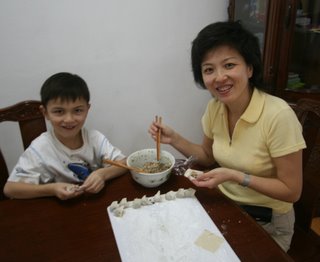 (Below: Yixin and Nicholas make homemade won-tons. Yum!) From the back seat I peered up at the passengers, knowing that their view was more advantageous for seeing the city scape over the highway median. But for me, the best view was that of the locals, living in an apartment tucked away far from the popular attractions, tasting the local dishes at local prices, shopping for food in the local markets and taking public transportation around the city. Nick and Yixin gave me a glimpse of daily life in for Shanghai residents and the Chinese frame of mind.
(Below: Yixin and Nicholas make homemade won-tons. Yum!) From the back seat I peered up at the passengers, knowing that their view was more advantageous for seeing the city scape over the highway median. But for me, the best view was that of the locals, living in an apartment tucked away far from the popular attractions, tasting the local dishes at local prices, shopping for food in the local markets and taking public transportation around the city. Nick and Yixin gave me a glimpse of daily life in for Shanghai residents and the Chinese frame of mind.Caveat Emptor: Since Nick speaks five words of Chinese, Yixin translates for him on a regular basis. Yixin explains that often when negotiating for Nick, the local vendor offers Yixin a kickback for closing the deal (believing that Yixin is Nick’s translator, not his wife). Nick and Yixin do nothing to dispel that belief, but after a good game of good cop/bad cop, they get their price. Sometimes Yixin takes Nick out of the equation entirely as prices quoted to him are often four to five times higher than those quoted to locals and it is easier to cut out the westerner. For example, the other night before attending the Shanghai acrobatics show, Nick was offered a price of $362 dollars for five tickets. Away from us, Yixin obtained the same number of tickets for 260 yuan or $32 US. Moral of the story: bargain hard and you'll still probably pay too much.
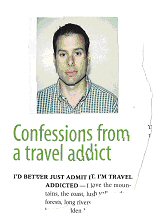

<< Home